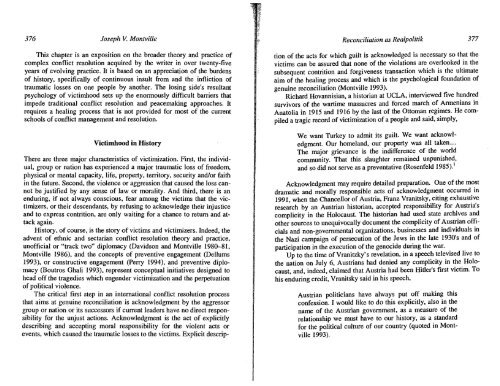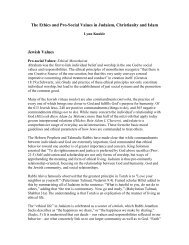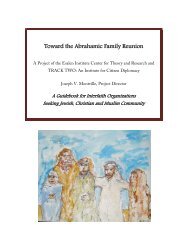Reconciliation as Realpolitik - Abrahamic Family Reunion
Reconciliation as Realpolitik - Abrahamic Family Reunion
Reconciliation as Realpolitik - Abrahamic Family Reunion
You also want an ePaper? Increase the reach of your titles
YUMPU automatically turns print PDFs into web optimized ePapers that Google loves.
376 Joseph V. Montville<br />
<strong>Reconciliation</strong> <strong>as</strong> <strong>Realpolitik</strong><br />
377<br />
This chapter is an exposition on the broader theory and practice of<br />
complex conflict resolution acquired by the writer in over twenty-five<br />
years of evolving practice. It is b<strong>as</strong>ed on an appreciation of the burdens<br />
of history, specifically of continuous insult from and the infliction of<br />
traumatic losses on one people by another. The losing side's resultant<br />
psychology of victimhood sets up the enormously difficult barriers that<br />
impede traditional conflict resolution and peacemaking approaches. It<br />
requires a healing process that is not provided for most of the current<br />
schools ofconflict management and resolution.<br />
Victimhood in History<br />
There are three major characteristics of victimization. First, the individual,<br />
group or nation h<strong>as</strong> experienced a major traumatic loss of freedom,<br />
physical or mental capacity, life, property, territory, security and/or faith<br />
in the future. Second, the violence or aggression that caused the loss cannot<br />
be justified by any sense of law or morality. And third, there is an<br />
enduring, if not always conscious, fear among the victims that the victimizers,<br />
or their descendants, by refusing to acknowledge their injustice<br />
and to express contrition, are only waiting for a chance to return and attack<br />
again.<br />
History, of course, is the story of victims and victimizers. Indeed, the<br />
advent of ethnic and sectarian conflict resolution theory and practice,<br />
unofficial or "track two" diplomacy (Davidson and Montville 1980-81,<br />
Montville 1986), and the concepts of preventive engagement (DeHums<br />
1993), or constructive engagement (Perry 1994), and preventive diplomacy<br />
(Boutros Ghali 1993), represent conceptual initiatives designed to<br />
head off the tragedies which engender victimization and the perpetuation<br />
of political violence.<br />
The critical first step in an international conflict resolution process<br />
that aims at genuine reconciliation is acknowledgment by the aggressor<br />
group or nation or its successors if current leaders have no direct responsibility<br />
for the unjust actions. Acknowledgment is the act of explicitly<br />
describing and accepting moral responsibility for the violent acts or<br />
events, which caused the traumatic losses to the victims. Explicit descrip-<br />
tion of the acts for which guilt is acknowledged is necessary so that the<br />
victims can be <strong>as</strong>sured that none of the violations are overlooked in the<br />
subsequent contrition and forgiveness transaction which is the ultimate<br />
aim of the healing process and which is the psychological foundation of<br />
genuine reconciliation (Montville 1993).<br />
Richard Hovannisian, a historian at UCLA, interviewed five hundred<br />
survivors of the wartime m<strong>as</strong>sacres and forced march of Armenians in<br />
Anatolia in 1915 and 1916 by the l<strong>as</strong>t of the Ottoman regimes. He compiled<br />
a tragic record of victimization of a people and said, simply,<br />
We want Turkey to admit its guilt. We want acknowledgment.<br />
Our homeland, our property w<strong>as</strong> all taken ....<br />
The major grievance is the indifference of the world<br />
community. That this slaughter remained unpunished,<br />
and so did not serve <strong>as</strong> a preventative (Rosenfeld 1985).1<br />
Acknowledgment may require detailed preparation. One of the most<br />
dramatic and morally responsible acts of acknowledgment occurred in<br />
1991, when the Chancellor of Austria, Franz Vranitsky, citing exhaustive<br />
research by an Austrian historian, accepted responsibility for Austria's<br />
complicity in the Holocaust. The historian had used state archives and<br />
other sources to unequivocally document the complicity of Austrian officials<br />
and non-governmental organizations, businesses and individuals in<br />
the Nazi campaign of persecution of the Jews in the late 1930's and of<br />
participation in the execution of the genocide during the war.<br />
Up to the time of Vranitzky' s revelation, in a speech televised live to<br />
the nation on July 6, Austrians had denied any complicity in the Holocaust,<br />
and. indeed, claimed that Austria had been Hitler's first victim. To<br />
his enduring credit, Vranitsky said in his speech.<br />
Austrian politicians have always put off making this<br />
confession. I would like to do this explicitly, also in the<br />
name of the Austrian government. <strong>as</strong> a me<strong>as</strong>ure of the<br />
relationship we must have to our history, <strong>as</strong> a standard<br />
for the political culture of our country (quoted in Mont~<br />
ville 1993).




